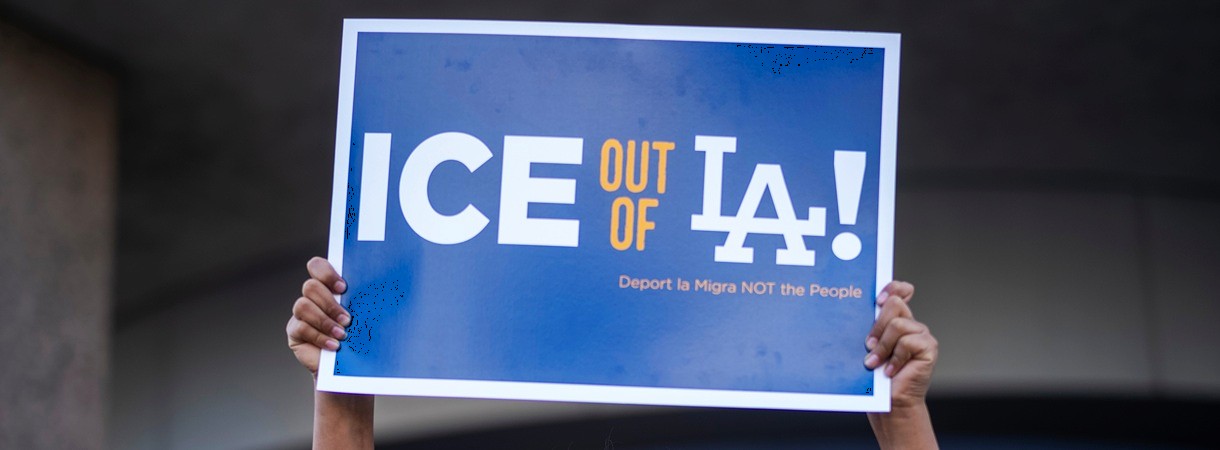The American Immigration Council’s new special report Mass Deportation: Analyzing the Trump Administration’s Attacks on Immigrants, Democracy, and America, focuses on immigration activity at the federal level during Trump’s first six months in office. But state and local governments have been making moves of their own.
While much of the public’s attention has rightly focused on the whirlwind of immigration-related activity at the federal level during the first six months of the second Trump administration, states and local communities have been far from idle this year. Some have leaned into the administration’s immigration enforcement priorities, while others are holding the line and pushing back.
State Legislation
As 2025 state legislative sessions wind down, a clear divide has emerged in how states are shaping policies that impact immigrant communities. Some are advancing inclusion and strengthening protection, while others are prioritizing enforcement and punitive measures.
In response to President Trump’s campaign promises, the Council urged state and local leaders to advance inclusive and protective policies for immigrants—and many did. New York and Rhode Island focused on safeguarding immigrant families and restricting enforcement in sensitive locations. Indiana and Washington enacted workforce legislation for international medical graduates, while Colorado and New Mexico strengthened data privacy and protections for immigrants.
On the other hand, some states advanced policies that undermine community trust, increase criminalization, and make immigrants’ lives harder. Measures forcing state and local police to collaborate with federal immigration enforcement, restricting access to education and services, and new penalties targeting local officials or service providers signal a shift toward punitive approaches that threaten the safety and well-being of communities.
The Business Community
The first six months of the Trump administration found the business community navigating a complex, uncertain, and volatile landscape, balancing the need to protect their workforce with the risks of speaking out.
In February, businesses nationwide participated in “A Day Without Immigrants” to highlight the harm of increased federal enforcement. In Texas, business leaders played a pivotal role in challenging efforts to repeal in-state tuition for undocumented students. In Nebraska, the business community joined efforts recognizing the important role of immigrants and the need for reform to address workforce needs and promote immigrant inclusion. Several businesses have also been vocal in supporting their immigrant neighbors and finding innovative ways to serve customers.
Local Communities
While some local communities aligned with the administration’s hardline enforcement tactics, many have chosen a different path.
For instance, Baltimore, Maryland, approved a $2 million increase in funding for the Mayor’s Office of Immigrant Affairs. In Texas, the Houston City Council—after significant community pressure—reversed course and voted to keep Hispanic, Asian, minority-women, and non-minority-women-owned businesses in its Minority and Women Business Enterprise program.
Responding to increased federal enforcement, localities have stepped up their investments in immigration legal services. In San Mateo County, California, the Board of Supervisors allocated $1.75 million to support legal access for residents facing deportation. Similarly, New York City nearly doubled funding for its legal services program, and California’s Santa Barbara County approved $240,000 to fund mental health services through the Immigrant Legal Defense Center to support community well-being amid increased deportations.
The correctional facility in Montgomery County, California, amended its policies to require judicial warrants before cooperating with federal immigration authorities. In Seattle, Washington, the city council vowed to protect immigrants in their community by prohibiting cooperation with federal law enforcement on immigration enforcement, and the mayor asked that all requests from U.S. Immigration and Customs Enforcement (ICE) or other federal authorities be directed to his office. In Albuquerque, New Mexico, the mayor and police chief reaffirmed the city’s commitment to protecting all residents, public safety grounded in trust, and the value immigrants bring to their community.
Office of New Americans State Network
Despite a shifting federal landscape, state Offices of New Americans (ONAs) across the country kept their focus: strengthening inclusion, expanding access to services, and equipping immigrants with information to navigate uncertain times.
During the first six month of Trump’s presidency, several states proposed the creation of new state ONAs in Alaska, California, Delaware, New Jersey, New Mexico, Pennsylvania, and Vermont. Delaware ultimately secured funding for a full-time ONA staff position through its state budget, and Vermont passed legislation to study the creation of an ONA. In total, 24 states now have an ONA or a senior policy person focused on immigrant and refugee affairs.
In New Mexico, the Department of Workforce Solutions and the Office of New Americans hosted a webinar for business leaders on recent federal immigration changes. Similarly, in Utah, the Center for Global Talent and the Center for Economic Opportunity and Belonging hosted a session to clarify employers’ rights and responsibilities in a changing policy landscape. In Illinois, the state’s Department of Human Services launched the Illinois Immigration Information Hub, a central online resource for updates on federal immigration policy, legal services, and community support.
Several states also prioritized continued access to legal services. In New Jersey, the ONA oversees the Detention and Deportation Defense Initiative, providing free legal representation to low-income immigrants facing removal, and the Legal Representation for Children and Youth Program recently completed a new request for proposals process. In Colorado, the Immigration Legal Defense Fund—administered by the ONA—continues to support immigrants in immigration court proceedings, and this year, a new law directs fines for certain data privacy violations to support the fund’s sustainability.
ONAs are also stepping up public education efforts, like promoting Know Your Rights (KYR) materials to ensure immigrants and their families are informed. In New Jersey, the ONA released a new KYR guide and New York’s ONA regularly promotes KYR content from community partners.
The Next Six Months and Beyond
State and local communities have demonstrated both courage and division in the first six months of the Trump administration—highlighting the role of local leaders in immigrant protection and well-being. Despite some communities choosing exclusion and fear, those standing with their immigrant neighbors demonstrate that a different path forward is possible—one rooted in shared values, inclusion, and the courage to challenge anti-immigrant narratives that scapegoat, criminalize, and dehumanize immigrants.
 The American Immigration Council is a non-profit, non-partisan organization.
The American Immigration Council is a non-profit, non-partisan organization. 


